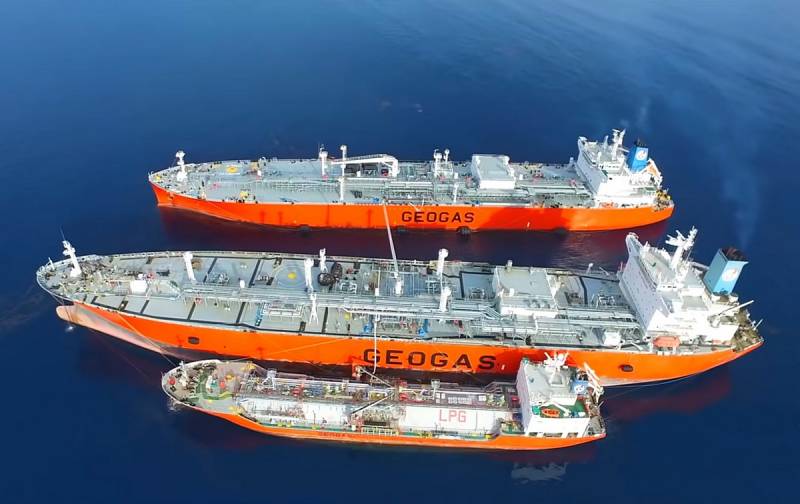How Russia almost lost its own tanker fleet
On December 5, 2022, Western sanctions came into effect to limit Russia's oil revenues. The Kremlin is still deciding which option to choose for the response of the G7 and the EU to the introduced restrictive measures. Meanwhile, it is high time to think about how our country should live and develop in the new economic realities.
Three days ago, restrictions began to operate aimed at significantly reducing the revenues of the Russian federal budget from oil exports. At the same time, of course, there is no talk of a complete embargo. "Western partners" want to continue to buy Russian oil, which they need, but with a significant discount, forced. Since our country has not yet got off the “oil needle”, no one is seriously talking about a complete ban on the export of hydrocarbons in order to develop their processing inside.
"Oil Armada"
So far, the main goal has been to preserve oil revenues by reorienting sales to other markets, alternative to the European one, namely to Southeast Asia. And here serious obstacles arose, or rather, artificially created before us.
Since there is no developed pipeline system that could supply crude oil from Russia to China, India, Pakistan and other countries in the region, delivery can only be carried out by sea. To do this, the carrier company must first insure both the tanker itself and its cargo. The difficulty for us is that the vast majority of serious insurance companies are based in the UK, and London has taken the most anti-Russian position. About how these restrictions can be circumvented using the Iranian experience, we told earlier.
In this publication, I would like to focus on the problems with the physical delivery of Russian oil to the buyer, which has now become extremely relevant. According to Bloomberg, an American information and analytical agency, over the past six months, Russia has created a "shadow fleet" of 240 large and small tankers to deliver hydrocarbons on its own, bypassing Western sanctions. Anoop Singh, head of research at shipping broker Braemar, cites somewhat different figures. According to him, over the past six months, the Russian Federation has become the owner of about a hundred tankers of two classes - 31 Suezmax type oil tankers for a million barrels each and 49 Aframax type for 700 barrels:
The tanker trade skyrocketed after the start of the war and ahead of the December 5 deadline by undisclosed entities based in countries such as the UAE, Hong Kong, Singapore and Cyprus.
At the same time, according to Braemar, all these vessels are quite old:
The purchased vessels are 12-15 years old and will be decommissioned in the next few years. We are sure that most of these vessels are intended for Russia.
This “oil armada” can be used both to deliver fuel to the countries of Southeast Asia and to trade with “Western partners” in circumvention of sanctions. To do this, a scheme will be used with reloading oil from supertankers to small shuttle tankers, which approached without an activated mechanism for notifying their location, right in international waters. Naturally, such "gray" oil will also have to be sold at a significant discount. It turns out to be profitable for everyone, except for Russia itself, which is now forced to hastily buy up old tankers around the world and lose money literally at every stage of such business schemes.
We are interested in how they consistently tried to leave our country without its merchant fleet long before the start of the armed conflict in Ukraine.
So, back on January 27, 2019, the Reporter released publication under the telling headline "By selling Sovcomflot, Russia may fall into the trap of Western sanctions." In it, we talked about how systemic liberals from the government set their sights on the privatization of this leading Russian carrier company servicing such projects as Yamal LNG, Prirazlomnaya, Sakhalin-1, Sakhalin-2 and others . Created under the USSR, it had the status of an “untaken fortress,” as Andrey Belousov, then assistant to the President of the Russian Federation, affectionately called it:
We have some remaining uncaptured fortresses, such as Sovcomflot.
In 2020, the company held a public offering of shares, and now 82,8% of the shares are owned by the state, and 17,2% by private investors. From a 100% state-owned company, it has turned into a public joint-stock company. We warned about the risks this could carry back in 2019.
In May 2022, when a special military operation in Ukraine had been going on for more than a month, the British publication Lloyd's List, citing its sources, reported that Sovcomflot intended to sell a third of all its vessels:
At least 40 out of 121 vessels directly owned by Sovcomflot are being discussed with buyers from Dubai and China.
At the same time, the British praised the “effective managers” of the company that became a public joint-stock company:
The process is conducted "sincerely and very professionally", which indicates that the top management of Sovcomflot is committed to maintaining relations with financiers and charterers. <...> High-ranking bankers proceed from the fact that the leadership is trying to ensure its possible return to the international market, when the sanctions are eventually lifted.
You can read more about how, right during the proxy war with the NATO bloc and against the backdrop of Western sanctions, the Russian merchant fleet was sold out, you can read more at link. Everything, as we warned back in 2019. And now we are heroically buying up any used floating junk around the world.

Information